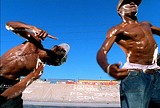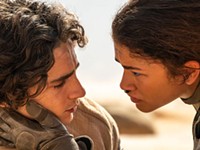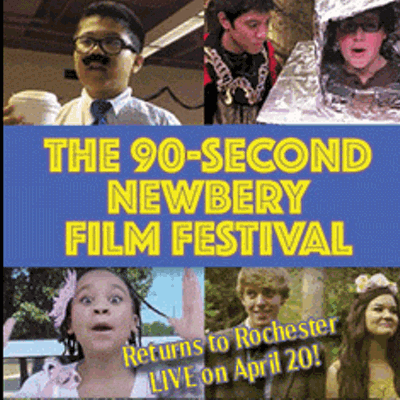[
{
"name": "500x250 Ad",
"insertPoint": "5",
"component": "15667920",
"parentWrapperClass": "",
"requiredCountToDisplay": "1"
}
]
Welcome to Filmmaking 101! Today's guest lecturer, director David LaChapelle, will show us how opening your movie with a title card that reads "The footage in this film has not been sped up in any way" is tantamount to --- yet less labor intensive than --- stapling each audience member to his or her chair.
Seriously, if you're going to kick things off with a bold yet cryptic disclaimer like that, you had better deliver. And celebrated photographer LaChapelle does just that with his debut feature Rize, a stirring documentary that ensconces itself in South Central Los Angeles to take a look at the phenomenon known as krumping.
What's krumping, you ask? It's a kinetic form of dance that could maybe be described as part hip-hop, part mosh, and part tribal, but trying to use words to explain movement is always futile. Krumping was originally known as clowning, and a man named Tom Johnson says he invented it. After a stint in jail during which he decided to turn his life around, Johnson donned a rainbow fright wig and pancake makeup to work at children's parties as Tommy the Clown. His dedication to entertaining kids and steering them away from thug life led him to form a hip-hop clown school, and that is where clowning evolved. South Central is now crawling with clown groups, which are seen as a productive alternative to joining a gang.
Tommy's acolytes fall into two categories: current and former. The people who still work with Tommy continue to perform for the residents of South Central and deliver their anti-gang message. Those who have flown Tommy's nest are the ones responsible for the evolution of krumping, which incorporates into clowning what the kids call "stripper dance."
Krumping is more raw, more confrontational, and more athletic than clowning. But clowns have also been known to krump, and krumpers paint their faces --- though it's more tribal in appearance than clown makeup. Clowns and krumpers are seemingly friendly adversaries, but there's a nagging undercurrent throughout the film that suggests both groups will have to work hard to ensure that the peace between them remains.
The film introduces us to a number of krumping's devotees, and they are a charismatic, resilient, well-spoken bunch of young people. Religion is important in their lives, as is family (both blood and makeshift), and their ambition and inventiveness is getting them noticed.
This is a generation that came of age during the 1992 Rodney King riots, so it has seen firsthand how bad things can get. Indiscriminate violence is still a part of everyday life, and Rize is actually dedicated to the memory of one of the dancers, a 15-year-old named Quinesha who was in the proverbial wrong place at the wrong time.
LaChapelle frames Rize so that when the showdown between the clowns and the krumpers known as Battle Zone V goes off at LA's Great Western Forum, we are fully aware of what's at stake. He takes the ferocious energy and intense pride that had been glimpsed up until that point and neatly packages it into a barrage of images and sound that make it impossible for a functioning human being to sit still.
The combatants at Battle Zone try to look incredibly bored --- but are obviously secretly impressed --- by the moves their foe unleashes during the skirmishes, and the passionate audience has definite opinions about which side should prevail. The hard-fought victory becomes bittersweet, however, as the Battle Zone winner is quickly brought back to earth; the unfortunate timing of the act of aggression seems far too coincidental to be random.
Rize was resourcefully filmed with a handheld camera and a tiny crew, though I would bet that LaChapelle --- also a successful music video director --- could have had access to tons of cash for his first film. His urgent filming style complements the spectacle known as krump, which we are told is never the same as it was the day before.
As the closing credits rolled on Rize I was asked what I thought about it. I said I really liked the film and I hoped people would come see it, then I clarified my wish: "And by that I mean I hope white people will come see it."
Don't make the mistake of thinking that Rize falls under the limiting Hollywood category of "urban film" just because the people on screen share a common hue. You may live the rest of your life and never get around to krumping, but you're no doubt familiar with adversity and spirit and the need for self-expression.
Rize (PG-13), David LaChapelle, director. Opens Friday, July 8, at the Little Theatre.
Latest in Movie Reviews
More by Dayna Papaleo
-

Festival Preview: ImageOut 2017
Oct 4, 2017 -
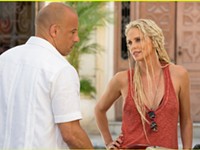
Film review: 'The Fate of the Furious'
Apr 17, 2017 -
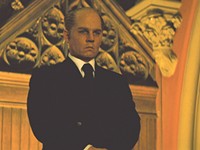
Rat tales
Sep 23, 2015 - More »
